Steven R. Boyett is a multi-tasking guy – in addition to being the author of the cult classic, post-apocalyptic fantasy novel Ariel, he’s also a renowned DJ, and produces three ridiculously successful music podcasts. Oh, and he also has a new book out this month, the highly anticipated sequel to Ariel, twenty-six years in the making, Elegy Beach. We read and loved Ariel, and so when we were presented with the opportunity to review Elegy Beach and interview the author, we were thrilled.
Ladies and Gents, please give it up for the talented Steven Boyett!
The Book Smugglers: First and foremost, thanks for taking the time to “chat” with us!
You wrote your debut novel, Ariel, when you were only nineteen years old. Since its publication in 1983, Ariel has become something of a cult classic in the fantasy genre. When and why did you decide to write a sequel, so many years later? What can fans and readers expect from Elegy Beach?
Steven: Almost all of the afterword to Elegy Beach concerns this very thing. The (relatively) short version is that I didn’t really decide to write it so much as it decided to be written. I never had any intention of writing a sequel and have said so for decades, quite publicly (including in Ariel’s afterword – oopsy). For a few years I’d had a notion of magic as a kind of operating system, a code set to which the universe would respond. I called it spellware. It was a cool idea but just that, not a story. Then one day I realized that spellware fit perfectly into the Ariel milieu, to the extent that it offered an explanation for it. Something in me had some things it wanted to say (some of it to the rest of me, which is always an interesting surprise), and so I set down to work on the book over my own objections, really. The writer in me wrote it while the rest of me enabled him and kept a watchful eye on the guy.
As for what people can expect from Elegy Beach, since it’s a Boyett book you can expect a road trip and a story that uses genre conventions but refuses to adhere to them. I’d like to think that they can expect a more mature version of this approach to fantasy, and to fiction in general, from someone who is more mature in his craft and in his life. And if they don’t think so, then they’re just big stinky doo doo heads.
The Book Smugglers: Ariel‘s title character is, of all things, a unicorn. And, as unicorns are often reduced to “girly” stereotypes (magical ponies with horns that live on sunshine and rainbows, or what have you) it had to take some guts to write your first novel with a talking unicorn for a protagonist – especially considering your largely male (adolescent) target audience. So, why did you choose to write about a unicorn? Did you do any mythological research about unicorns for the book? Do you have any favorite or recommended unicorn novels (or rather, books with unicorns in them)?
Steven: Science fiction and fantasy are chock full of tropes worn so smooth by overuse that nothing will stick to them any more. Even at 19 I couldn’t understand why anyone would want to utilize them for any reason other than to subvert them. Do we seriously need another quest story about humanoids who set out in a bunch to destroy/recover/trigger some talisman? Fiction at that point is nothing more than a Mad Lib. Hemingway wrote that “What a writer in our time has to do is write what hasn’t been written before or beat dead men at what they have done.” The ample evidence contained in bookstores demonstrates that apparently this isn’t easily done, which frankly boggles me. It’s the difference between talent and creativity
To my view (boy is this gonna go over well) the mere and continual reenactment of stories and iconography that have all occurred before, the mere and constant reshuffling of the deck of tropes, is just a kind of pornography. It exists to placate, it serves as an engine of distraction. What endeavors to break from that, or even only to recontextualize it, as Star Wars did, is memorable. What elects not to pander or be safe is memorable. I am not remotely impugning people who do are able to feed their dog and put gas in their car by virtue of the power of their imagination. It’s a great good thing and a lot of hard debilitating work. But the need to buy groceries becomes itself a pressure not to take chances, because by definition the new is hardly ever met with recognition. I have no desire to be another snowflake in that avalanche. I would rather not be able to buy groceries, and often I did not.
I don’t believe in unicorns and I need convincing. My hardwired approach is that readers are of the same view. (Readers who are predisposed to believe in unicorns don’t represent much challenge at all, do they?) I sure as hell don’t believe in talking unicorns. So I’m more inclined to go fo rit if the unicorn has to have a foul mouth and be a smartass who constantly messes with people’s perceptions of it as a fwuffy magic bunny thingy. Then you’re commenting on the idea of unicorn itself. You’re pulling off a magic trick: by calling attention to what the unicorn says and how the unicorn says it you’ve completely distracted the reader from the fact that the unicorn is saying at all. You’re carving your name on that wellworn trope. You’re winning over the cynics and not preaching to the choir. Hallefrigginlujah. To me the most obvious and natural reaction to seeing a talking horse would be Holy shit a talking horse! But how often do we see that happen? It’s as if the writer fears the illusion will break down if it’s pointed out. But in fact the illusion is fortified by concrete detail.
I did do some research on history and depictions of unicorns in history (I can recommend Odell Shepherd’s The Lore of the Unicorn as a great reference), but regarding unicorns themselves I have absolutely no interest in them and no unicorn bibliography. I care about characters and good plotting and admirable prose. I’ll read about washing dishes if it’s beautifully done. To read a book because it’s got a unicorn in it seems to me to (if you’ll forgive me) put the cart before the horse. Anyone who knows me (and it’s not hard to infer from my curmudgeonly tone in the above) knows that the last thing in the world you’d think I’d write about would be unicorns. And they’re right! The only reason to do it is to pee in the pool! Make it yours! No one will hurt you. Readers will be pissed and critics will ding you, but in the long run it will be a singular creation and not another item in a long run excreted by some factory. I’d rather take a chance and fail than be safe and succeed.
I didn’t really choose to write about a unicorn; it chose me. I had a vivid image of a young man and a unicorn walking along an abandoned interstate, and the contrast and mystery of that image were powerful enough to set me on my way. I think that image drives the novel. I hd no target audience of adolescent males; I pretty much was an adolescent male when I wrote the book. In that sense it’s probably true to say that Ariel did not adhere to the traditional girly-girl meets fwuffy unicorn cliche not because of some great bravura step-outside-the-box auteur approach but because I was a 19-year-old kid who didn’t know any better.
The Book Smugglers: Ariel blends elements of post-apocalyptic fiction with traditional fantasy. What inspired you to mix these two genres?
Steven: I don’t think it was a conscious decision, really. I actually grew up reading more science fiction than fantasy, and (to be a bit reductionist here) I think I take a more SF approach to fantasy. A lot of fantasy has a fairy-tale mindset that we’re all just going to suspend our disbelief and go with whatever gets thrown our way, an approach that lets Harry Potter pull a rabbit out of his ass every time he’s cornered. I need more interior logic than that. My impossible things need some foundation. Ultimately this has to break down, because when pushed for ultimately possible explanations, really in fantasy it won’t be there. Thus the designation fantasy. In an ironic way it’s a kind of failure of imagination on my part: I can’t just make something up and be done with it; it’s got to be anchored by something I can work with. Oddly enough it’s the contrast that makes it work. Ariel set in some magic happy elfie land would be perfectly forgettable. It’s been done a thousand times and there was no need to make it a thousand and one. But setting a flat-out quest-type fantasy in our own world is interesting to me. It adds a lot of texture, and lets you comment on the purposes of fantasy itself. I’m all meta like that.
The Book Smugglers: What are your favorite (post-)apocalyptic/dystopian and fantasy novels?
Steven: Dhalgren, by Samuel R. Delany. The Road, by Cormac McCarthy. The Stand (original version), by Stephen King. On the Beach, by Neville Shute. I Am Legend, by Richard Matheson. Emergence, by David Palmer. I’m sure there are a bunch more, but those stand out for me. Some of the books regarded as classics in the field are missing here because they bored me to tears. I’ll be nice and not name names.
The Book Smugglers: Ariel has been blessed by the Gorgeous Cover Gods – all three cover images are fantastic, as is the cover for the upcoming Elegy Beach. Which one is your favorite?
Steven: I’ve definitely been lucky, haven’t I? I’m told it’s easy to illustrate my work because I’m a very visual writer, so maybe that’s helped, but I certainly can’t take credit for these astonishingly good covers. I don’t have a favorite because I really do love all three. I own the original Barclay Shaw painting for the first cover. People tell me it’s dated now (without seeming to realize that the new cover will be dated 30 years from now as well), and certainly the fashion and more airbrushed look reflect the period. But I simply love the characters he presents here. They look like my characters to me (weirdly enough, at the time friends assumed Barclay had used a photo of me for Pete because the depiction looked a lot like me, but it was just another of the many wonderful coincidences that populate my life).
The Rob Alexander cover for the original Scorpius e-book version captures the novel’s mood perfectly, I think. He understands the poetry of decay and manages to make the unicorn a contrast to it and yet part of it at the same time. In the Shaw and Alexander paintings I also think it was probably difficult to paint a unicorn without being sappy or clichéd.
The more recent Steve Stone cover is a perfect representation of the novel’s approach. There is no unicorn at all (there’s no human on the Rob Alexander cover). Everything in it screams postapocalypse. But then there’s that katana in the character’s hand to lend it a kind of videogame aspect. It’s hard-edged, concrete, detailed, gritty. It would be difficult nowadays to put a unicorn on the cover and still convey the fact that Ariel is a very concretely written novel. It would stand a good chance of scaring away the very audience that might like it, whereas elfie stuffed-animal unicorn bunny lovers would read it and say What the living hell is this? Ace’s marketing people were very canny about this, I think, and they have my undying admiration and gratitude for reading the book (itself a miracle, really) and understanding how best to represent it.
Ditto Elegy Beach. It just feels like the book to me. Steve Stone did a wonderful job.
The Book Smugglers: World-wide nuclear war breaks out; aliens invade from outer space; zombies awaken with an insatiable hunger for human flesh; a deadly virus sweeps the globe; a hellbent comet crashes into the earth; the laws of Newtonian physics fail and magic rules. What’s the disaster scenario you would choose to live through?
Steven: Gotta go with the Change on this one. No stinky bodies to clean up, no zombies to fight, no megatsunamis to surf. In fact I think that’s probably why the Change exists as a background: I didn’t want to get bogged down in the why of it and in the details of the disaster’s process; I wanted to deal with what followed. I’m fascinated by what happens to groups when the rules are removed, from massive power failures to The Lord of the Flies to Burning Man. I just wanted it to have already happened and be largely inexplicable; now let’s move on, thank you, drive through.
Cormac McCarthy gets dinged by SF readers for not explaining what happened to the world in The Road. I think that’s a laughably irrelevant thing to ask of him. It’s not about the thing, it’s about what happened to people after the thing. A science fiction writer would have brought in a guy with broken Buddy Holly glasses and a shredded white coat crawling around the ruins and muttering something about how sorry he is for being part of the hadron collider experiment, if only he’d known. And it would just sit there in that book steaming like the pile it would be. I think SF self ghettoizes in this way: it becomes about the explanations.
The Book Smugglers: In addition to being a bestselling author, you also are a DJ and (according to your biography) a didgeridoo player. Why did you turn to music from writing? And how the heck did you get interested in the didgeridoo?
Steven: This is part of that myth that seems to manifest, that you’re either one or the other. I’m a DJ and podcaster for a living and a writer for a living. I’m both. Two full-time careers in one full-time life. I could give up one and make a living solely from the other. But why do that? This is so damned fun. Challenging, time-consuming, frustrating, Type A fun. But fun nonetheless.
Having said that: I did actually quit writing for about four or five years. It’d take too long to explain why, though I touch on it in the Elegy Beach afterword. Suffice to say the universe didn’t seem to want me to write, and I know better than to argue with the universe. But I had only ever been a writer (well, and for 25 years a martial artist), and had no idea what to do with myself when I stopped. What to call myself.
I taught myself to play the didgeridoo because I’d always loved the sound of the instrument, and also because it was something that I couldn’t exploit. I’ve never known how to create something without then taking a lot of effort to put it out there in the world. The didgeridoo is a hollow log. I wasn’t gonna get hot chicks, have a world tour, pay my rent, or fret over royalties because I played it. I had no expectation regarding it. In that way it was pure: I was simply doing it because I liked it.
But being me I couldn’t leave well enough alone. I’d become obsessed with electronic dance music, and I wanted to record didge over it. That’s been done a bunch by now but at the time I’d never heard it. So (being me) I started composing electronic dance music, and learned about audio production and mixing and digital recording systems and a ridiculous amount of stuff. DJ culture is very tied in to this, and I became interested in learning how DJ’s stitch together these electronic pieces, so I learned how to DJ. I put up two music podcasts, and immediately one of them (Podrunner) was featured on iTunes and has been one of the world’s most popular podcasts ever since. It has set me on a great adventure, doing things I never otherwise would have experienced. Playing in a tower in front of a stage surrounded by sound-activated flame cannons at Burning Man. Playing the Hard Rock in Vegas. I mean, jeez.
I’d actually started Elegy Beach when Podrunner hit, and the novel got derailed for three years while I learned an entirely new career. So yet again here I am not knowing how to leave something the hell alone. I mean, my luck is ridiculous – it’s the product of a lot of work and careful consideration and timing but it’s luck nonetheless and I certainly don’t take it for granted.
But what I learned by learning to play the didgeridoo (there’s video of me playing at the end of this long talk at http://www.ustream.tv/recorded/963796) is that I really can do things for the fun of it and approach them without expectation. Where it all went after that is a horribly lucky ironic joke, really.
The Book Smugglers: Aaargh! The Change has come, but by virtue of some strange magic you are able to save ONE book, ONE movie and ONE song. Quick! What are they?
Steven: Dhalgren, simply for its complexity, narrative scope, density, and ability to yield more treasure on every reading.
Toto the Hero, by Jaco van Dormael, my favorite movie. Good luck finding this in the U.S.
Ninth Symphony, Beethoven, if I can be allowed to count it as a song. Otherwise the thought of listening to my one favorite song over and over strikes me as some horrible fate. But if I can’t count the Ninth, then “Solsbury Hill,” by Peter Gabriel. How’s that for eclectic.
Steven R. Boyett has written novels, short stories, comic books, feature films, essays, and reviews. As a DJ he has played clubs in Los Angeles, San Francisco, Las Vegas, and Reno, as well as at Burning Man. He produces three of the world’s most popular music podcasts (Podrunner, Podrunner: Intervals, and Groovelectric), and was among the first people to make a living in that medium.
As owner of Sneaker Press Boyett published poetry chapbooks by Carrie Etter and the late Nancy Lambert. He has also been a martial-arts instructor, paper marbler, advertising copywriter, editor, typesetter, and proofreader. He designs websites, plays the didgeridoo, and composes electronic music. He lives in Los Angeles with his wife, composer Maureen Halderson, and their two parrots.
A huge THANK YOU to Steven for taking the time to chat with us! You can read more about Steven online at his website, blog, and official sites for Ariel and Elegy Beach.
Make sure to stick around, as tomorrow we review Steven’s long awaited sequel, Elegy Beach, with a giveaway opportunity!

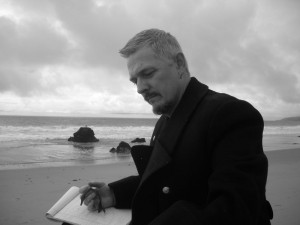
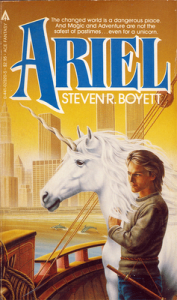
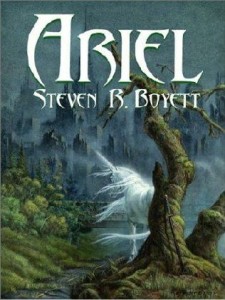
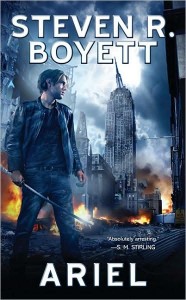
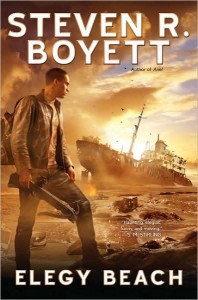
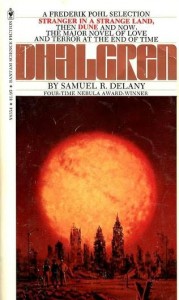
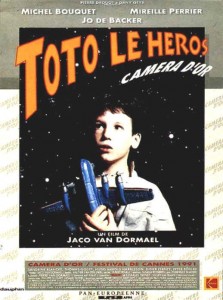








5 Comments
RKCharron
November 2, 2009 at 3:46 amHi 🙂
Thank you for the fantastic interview with renowned author Stephen Boyett. Thanks to Stephen for sharing. I really enjoyed learning more about him and his writing.
All the best,
RKCharron
xoxo
janicu
November 2, 2009 at 7:54 amI own the book with the original cover (Barclay Shaw), and that’s my favorite still. I don’t care that it’s dated!
KMont
November 3, 2009 at 5:54 amThis was a great interview, ladies and gent. 😉 And a great reminder to order these books. Which I think I’ll go and do now.
Let the Games Begin « Write Now
November 3, 2009 at 10:31 am[…] Book Smugglers interview with […]
Rhiannon Hart
November 4, 2009 at 2:39 amLovely in depth interview! I have my copy of Ariel sitting there waiting for me. And I’m so ashamed that I have read none of Boyett’s favourite dystopias. But I shall!